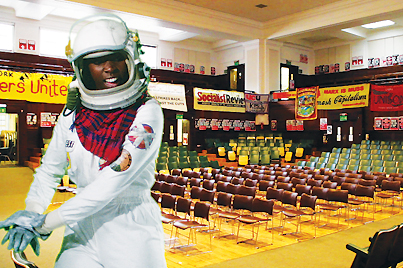 Cimatheque in downtown Cairo is premiering Deep State this evening, a film from the UK about the concept of a ‘state within a state.’ The name comes from a Turkish expression meaning the same thing whereby the ‘deep’ state is a network of relations and interests where the real and fundamental decisions are made. The film is directed by Karen Mirza and Brad Butler and scripted by both, with the collaboration of author China Miéville.
Cimatheque in downtown Cairo is premiering Deep State this evening, a film from the UK about the concept of a ‘state within a state.’ The name comes from a Turkish expression meaning the same thing whereby the ‘deep’ state is a network of relations and interests where the real and fundamental decisions are made. The film is directed by Karen Mirza and Brad Butler and scripted by both, with the collaboration of author China Miéville.
“The term came to us in Istanbul and it resonated with our experience in the UK. We wanted to do a film on the revolutionary imaginary of these fictional and real moments,” Karen Mirza explained. The concept of the film is not nation specific, however, “the ‘deep’ state can be applied in the global sense with the neoliberal paradigm and corporate interests. The formation of a new state is still from top down and not bottom up. It is also important to stress that as filmmakers, we no longer just make films, they are a tool. A tool for pedagogy, for organisation, and films are collaborative, we work for the writer, who in this case is active politically, and very talented in producing an image that we can use.”
You could get the impression that the film will stress the hegemonic factor of power in the creation of a structure the organisers say often runs counter to the ‘outwards democracy’ of the modern state. They also add that one can see the effects of the ‘deep’ state, but never prove its existence, through what they call rhetorical positions and counter-languages; the raising of a fist, acts of rebellion and the throwing of a rock as responses to legitimised, or in this case, state-sanctioned instances of violence such as the raising of a baton or the throwing of a tear gas canister.
If the premise sounds semi-Foucaultian and difficult to understand, it is. Mirza commented on the premise of the film. “It is a modern tale of insurrectionary struggles that wants to speak about the term of the ‘deep’ state, the complexity of power, the forces that operate on the state and through the state, which is then internalised by us as citizens.”
That transfer to the cinema will, however, be one of the most interesting aspects of the film. The premise is anything from being deceptively simple to being a product of downright obscurantism. And explaining it in words is different from putting it on screen which will be no easy task for the three filmmakers. “It was important to use both archival footage and new footage. We are basically interrogating the political imagination through the archive, how political struggle has been imagined through cinema and exploring new languages of insurrectionary,” Mirza explained.
The challenges the filmmakers faced were “accessing the material because most of it is privatised. Furthermore we had to be careful that we utilised the material in a way that does not collapse individual struggle into a DJ mix. We used no grand narrative of our own but chose to bring out the individual narratives and wanted to see what the new languages of resistance that have been used are.”
The subject matter of the film is timely according to Mirza. “I live in a failed democracy, in my personal opinion [the United Kindom]. We have a huge opportunity to rethink the concepts of state, no borders and democracy and re-practice the production of an ethical state and social justice. The film is a continual struggle, not in the classical sense of power of the 30’s and 40’s but how we self-regulate because we internalise structures that have come to represent “democracy” for us. I believe we need to rid ourselves of these structures that we have internalised.”
Whether it affords us profound insight or not, attendance is free and the film starts at 9 pm. Cimatheque gives us a rare opportunity to so go and decide for ourselves whether or not Deep State deals with its subject matter in a subtle and refined manner or whether it is all style and no substance.




